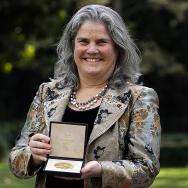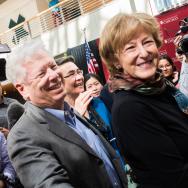Renowned University of California, Berkeley scholar David Card, a former University of Chicago faculty member, has won a share of the Sveriges Riksbank Prize in Economic Sciences in Memory of Alfred Nobel 2021.
Card began his scholarly career as an assistant professor in the Graduate School of Business (now Chicago Booth) from 1982–83. Currently the Class of 1950 Professor of Economics at Berkeley, he is now among the 94 scholars associated with UChicago to have received a Nobel Prize.
Announcing the prize on Oct. 11, the Royal Swedish Academy of Sciences cited Card “for his empirical contributions to labour economics.” Card shared the prize along with Joshua Angrist of the Massachusetts Institute of Technology and Guido Imbens of Stanford University, who were honored “for their methodological contributions to the analysis of causal relationships.”
“To the extent that my career has been successful, it’s really building on the contributions of so many people,” Card said during a news conference hosted by UC Berkeley. He acknowledged years of support from family, friends, colleagues and graduate students, and thanked in particular his longtime collaborator, the late Alan Krueger of Princeton University: “I’m sure that if Alan were still with us, he would be sharing this prize with me.”
One of his major contributions to economics, Card said, was “the idea of trying to learn about society and economic forces in society from observing disruptive events.” This, he added, was part of a broader trend within economics toward a more empirical discipline supported by the use of large datasets.
Card joins the more than 30 economists affiliated with UChicago to be named Nobel laureates, including seven current UChicago faculty members: Profs. Michael Kremer (2019), Richard Thaler (2017), Eugene Fama and Lars Peter Hansen (2013), Roger Myerson (2007), James Heckman (2000) and Robert E. Lucas Jr. (1995).
‘Insatiable curiosity’
Among the current UChicago faculty who have worked closely with Card is Prof. Michael Greenstone, whom Card advised as a graduate student at Princeton.
“David Card’s insatiable curiosity and willingness to do whatever it takes—develop new methods, collect new data, design clever cuts of data, etc.—has allowed us to understand the world better,” said Greenstone, the Milton Friedman Distinguished Service Professor in Economics, the College and the Harris School of Public Policy. “There is no higher goal for an economist. His influence is not just measured by his papers and their findings but also by the legions of former students who he trained, myself included, to join him on the task of shedding light on a complicated and messy world where humans do not always behave as mathematical models say they should.”
As a labor economist, Card has focused, in part, on studying the effects of factors such as minimum wage, immigration and education on the labor market. Because these outcomes are related to policy, they cannot be manipulated directly by researchers. Nevertheless, Card has shown that important insights can be drawn from such data through the use of “natural field experiments,” which examine situations in real life that simulate the circumstances of a controlled experiment.
For example, Card once studied the impact of increasing the minimum wage by comparing adjacent areas in Pennsylvania and New Jersey. New Jersey had raised its minimum wage to $5.05 per hour from $4.25, whereas Pennsylvania’s had remained constant.
Contrary to conventional economic wisdom at the time, Card and Krueger found “no indication that the rise in the minimum wage reduced employment” at the fast food restaurants they studied. According to their 1993 paper, increasing minimum wage actually increased employment in some cases.
The finding had a major impact on the field, as economists reconsidered the social value of the minimum wage and the relationship between higher wages and the unemployment rate. Many scholars had thought that higher wages would lead to fewer jobs, but Card’s work showed that the relationship was more complicated, and highlighted the value of empirical evidence to support such claims.
Card also has made a lasting impact as a mentor. After leaving UChicago in 1983, he taught at Princeton University for more than a decade. He has been on the Berkeley faculty since 1998.
“He was always very generous with his time, and always willing to give feedback and thoughts on my ideas and papers,” said Prof. Devin Pope of Chicago Booth, who was advised by Card as a doctoral student at Berkeley. “One thing that I particularly like about his work is that he makes it transparent: He alway uses figures that clearly show what the data are expressing about the question he has in mind. He’s an inspiring person whose research has really been ahead of its time.”
Before receiving the Nobel, Card was awarded the John Bates Clark Medal from the American Economic Association in 1995, a prize which honors the top U.S. economist under age 40.

